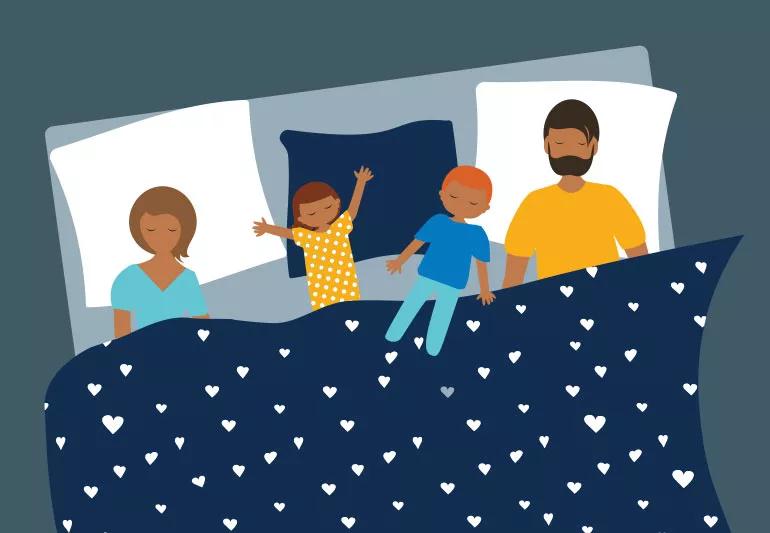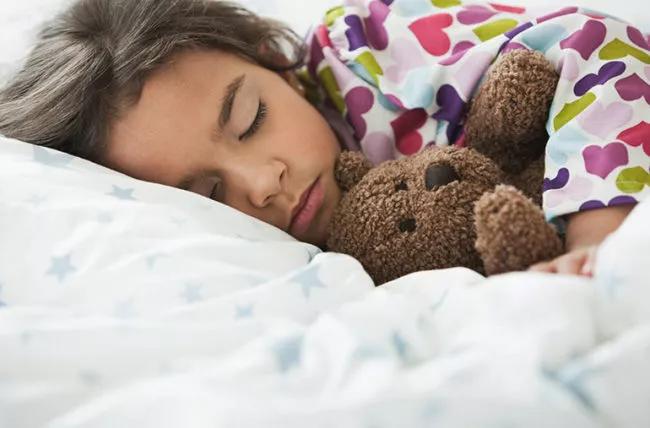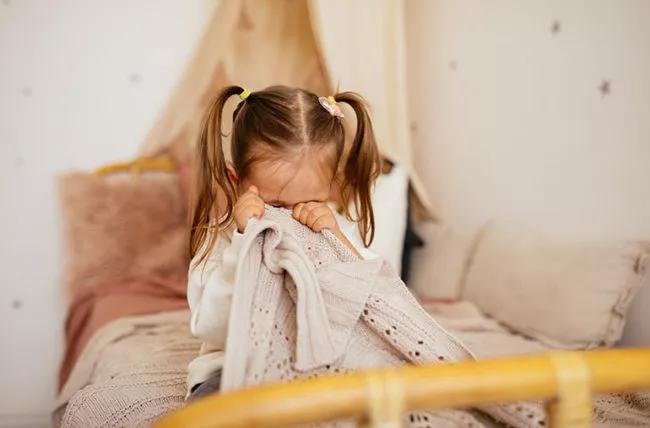Advertisement
Children don’t come with an instruction manual, but here's our best advice for a good night’s rest

Sleep is one of our most basic human needs. So why does it seem the little humans in our lives are so dead-set against it sometimes?
Advertisement
Cleveland Clinic is a non-profit academic medical center. Advertising on our site helps support our mission. We do not endorse non-Cleveland Clinic products or services. Policy
From babies who need a little help learning to get some shut-eye, to toddlers who need some positive reminders of the beauty of the letter ZZZ, to signs your teenager has been up too late texting and Tik Tok-ing, we’re sharing some of our best advice for making sure your kids get their beauty rest.

1. Know how much sleep your child needs
First things first. We talked with pediatric sleep specialist Vaishal Shah, MD, about how much sleep your child needs. As with so many things in their early years, the number of hours your kids will need to sleep will change with time. Set a consistent bedtime by starting with knowing when your child needs to wake up the next day and counting back, based on the recommended hours of sleep.

2. Sleep training for babies
Around 4 months old, your baby should be ready for sleep training, says pediatrician Noah Schwartz, MD. That means their sleep-wake cycles will start to be more regular and they’re ready to learn to fall asleep by themselves.
For babies, sleep training means learning to self-soothe. For parents, it means more sleep for you! (Finally!)
Remember, babies shouldn’t sleep in bed with you. Their crib should be free from bumpers, blankets and other hazards.

3. Tackle sleep regressions
So your infant is falling asleep by themselves, in their crib and making it through the night. You win!
Except… suddenly not so much.
It’s OK. Sleep regressions are common, says pediatrician Heidi Szugye, DO, IBCLC. Babies’ ability to sleep deeply and for long stretches can go through cycles. It’s normal, especially as your little one grows and is working on new milestones, like talking and walking. Stick to your routine and this, too, shall pass.

4. Help your toddler go to bed, and stay there
The infant years are behind you. Your toddler has moved to a big-kid bed, and, well, things aren’t going so well. All that newfound freedom means they need one more drink of water. One more kiss goodnight. One more story.
We’ve got you covered. From sleep fairies to stickers, use consistent routines and heaps of positive reinforcement, pediatric specialist Jason Sherman, DO, offers advice to help your toddler get to sleep and stay there.

5. Know the signs that they need more sleep
Even with your best intentions, a lot of kids don’t get as much sleep as they should. Studies say about a third of kids aren’t getting the recommended amount of sleep. Exhaustion doesn’t always look like yawns and naps. It can mean more tantrums for little ones and difficulties in school for older kids and teens.
Advertisement
Whether they’re too young to tell you they’re tired, or getting too old to want to admit to it, Dr. Shah explains how to spot the signs of exhaustion in your children.

6. Don’t immediately reach for the melatonin
All signs point to a sleep-deprived kid? Start by working on their behavior before you reach for the melatonin, say pediatricians Gina Robinson, MD, and Timothy Benik, DO. While not necessarily bad for kids, melatonin doesn’t get to the root of the issue. Melatonin is a hormone that’s naturally produced by your body to help calm you down and prepare for sleep. And while it can be used effectively (with a healthcare provider’s guidance on dosage), it’s not recommended to be your first line of defense.

7. Don’t forget about your sleep, too!
You’ve heard it before, but it’s worth saying again (and again!). You’re more than a parent. You’re a person with your own needs. And that means your sleep is important, too. (How else are you going to tackle that morning meeting, make dinner and safely shuttle the kids off to their various activities?)
When it comes to keeping yourself healthy, sleep is up there with eating right and exercising, says sleep expert Michelle Drerup, PsyD, DBSM. Taking care of yourself will help to make sure you can take care of your kids, and set a good example for them to get some shut-eye, too!
Sweet dreams, family!
Advertisement
Learn more about our editorial process.
Advertisement

Integrating coping skills into your teen’s daily routine helps turn self-care into a lifelong healthy habit

Yes, it’s safe for babies starting at about 9 months old and can help clear nasal mucus

Local LGBT centers, online directories, visual cues and gender-affirming care or non-discrimination policies can all be helpful resources and cues

From newborn through teen years, your child’s sleep needs will change

Early weight gain can lead to health issues like heart disease, diabetes and cancer

Sleeping with separate blankets can help you get the ZZZs you need — without fighting for covers all night

Current research suggests 1 out of every 36 children in the U.S. has ASD — and that’s probably an undercount

For starters, autism spectrum disorder isn’t a disease

Focus on your body’s metabolic set point by eating healthy foods, making exercise a part of your routine and reducing stress

PFAS chemicals may make life easier — but they aren’t always so easy on the human body

While there’s little risk in trying this hair care treatment, there isn’t much science to back up the claims